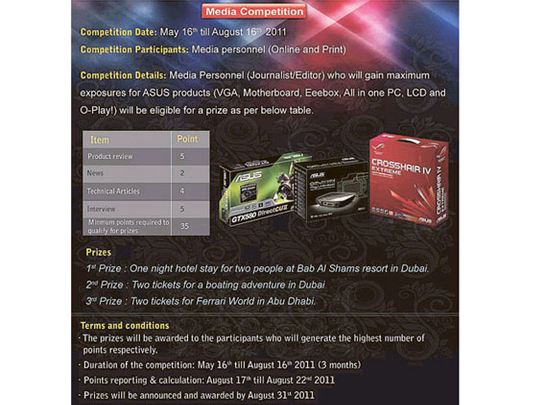
Dubai: Corporate houses often offer the occasional sop or incentive to journalists to win favourable coverage for themselves — normally done relatively discreetly. But a recent one from the PC and tech hardware company ASUS throws discretion to the wind.
On Tuesday, ASUS launched an advertising campaign aimed at the local media under the title of ‘Media Competition'. It offers journalists who provide coverage for its products a chance to win prizes including a night in a leading five-star hotel.
These are to be awarded based on the number of points earned over a three-month period, and dependent on the type of coverage ASUS receives. The advertisement, which was emailed to media companies by its internal marketing company, states that five points would be awarded for a product review, two points for news-specific articles, four points for technical articles and five points for interviews.
Points system
The points total required is 35.
On following up, Gulf News was told by ASUS that the competition was ‘on hold' less than 24 hours after its release.
Industry professionals roundly condemed the move."This campaign represents a lack of respect for media; inducements to the media whether it's gifts, cash or a holiday are not acceptable," said Alex McNabb, group account director at Spot On PR.
"It degrades both the journalist and the marketing people, and sets a worrying climate. People working in marketing in turn will get pressured by their own clients to carry out similar schemes."
According to the code of conduct laid out by the Middle East Public Relations Association (MEPRA), gifts to the media up to the value of Dh185 are acceptable. "It was felt by some to be high, but was accepted by the fact that people in the Middle East tend to be open-handed," said McNabb.
According to the Pan Arab Research Centre (Parc), 64 per cent of the population in the UAE agree it is important that a company acts ethically. "The major advertisers accord very high importance to corporate social responsibility and increase in their brand equity," M. Shaharyar Umar of Parc said.
In 2006, Philips was criticised for offering local journalists a chance to win an all-expense paid trip to the football World Cup in exchange for coverage.
Two years later, AdNation Middle East wrote an article highlighting the practice of attracting journalists to press conferences by enticing them with offers of gifts.
Alternatives
With the recent tightening of budgets available for advertising and marketing campaigns, companies have looked to alternative and more economical ways to profile their products.
Advertising in the UAE plunged 27 per cent in 2009 and another 3 per cent last year. The market was up 3 per cent in the first quarter of this year.
"There's been a rise in people using social media and doing competitions with blogs and Twitter," said McNabb. "It's a very short term strategy and I do believe there is less and less tolerance for retailers patronising consumers by giving them giveaways.
"The medium to long term strategy is good, old-fashioned things like engaging and listening to customers."












